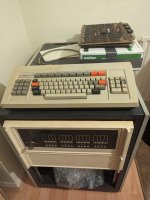Terri Kennedy
Veteran Member
I never had any, other than what CAE provided to Royal Air Maroc. It was just a weird coincidence that I ended up maintaining the simulator - I went there the first time to support an Alpha Micro system that was intended to just track their inventory of spare parts for the simulator. As I was getting ready to head back to the US, one of my site contacts asked me if I knew anything about other computers, and I said yes.If you run across any more docs on that system, please let us know.
It turns out that they didn't purchase a maintenance contract for the simulator, and as parts broke they'd used up all of their good on-site spares. They then resorted to finding I/O boards where one channel wasn't used on that particular simulator and swap the bad board into that position where the defect didn't matter because that particular channel wasn't used in that position. So any further board swapping would either introduce 2 new defects and keep the original defect (if neither swapped board was actually causing the original problem) or would swap the original problem for 2 new unrelated ones.
This could cause some pretty jarring side effects (remember, these I/O boards are doing things like controlling the hydraulic actuators that make the simulator pitch and yaw). The software control that provided limits to those movements had no effect if the interface card was bad - you'd go from level flight to "anything not nailed down flying around the cockpit" in an instant. After I fixed the original problem they asked me to look at, I said that they needed to get all of the other in-service cards back to a state of 100% functionality as well as the spares. I ended up staying for an extra 2 weeks or so that time, repairing a bunch of the cards. They had all of the test equipment, etc. needed - they had just never been trained on component-level repair.
At the time, they had one 747, which was the only plane in their fleet capable of flying CMN-JFK non-stop. It had a convertible interior and could be configured for passenger service, freight, or their equivalent of Air Force One for the King. When I was finished and ready to head home, that plane wasn't available as the King was on extended international travel. After around a week and a half, the airline decided to charter a flight back to JFK from Air Canada for me and a half dozen travel agents that had also become stuck in Morocco (they didn't want to antagonize the agents who were responsible for bringing in tourists with American dollars). So it was a 747 with only 7 passengers.
Reading about the governments of Hassan II and his successor, Mohammed VI, makes it sound like a horrible place to be. To myself as a naive 20-year-old it seemed like a nice place - people in Casablanca were friendly and could go about their lives seemingly without oppression. The army was visible but also friendly. The only hint that not all was as it should be was that the currency exchange rate was a lot better at the illegal exchanges, and the rate depended on the size of the bills you brought, with $100 bills getting the most favorable rate. I did observe an incident with bandits out in the desert (freaky / very scary).
A much nicer and open place than Venezuela, where I also went on a consulting job. Any time the customer says "Thank goodness you're here!" with a sense of excited relief when you're just installing a protocol converter makes you want to ask why they're so relieved. The answer I got was "The bank sent down a VP and the rebels kidnapped him, burned the white Bentley and killed the driver we sent to pick him up. Just last week the VP staggered down from the hills half-starved in his underwear when he escaped." NOT the kind of thing you want to hear. And when trying to leave, stereotypical dark-eyeglass-wearing Latin American army types were roaming the airport, picking people at random and saying "Pay airport tax!" while having one hand on their weapons. Apparently this "tax" wend directly into the pocket of the each of the army guys.

